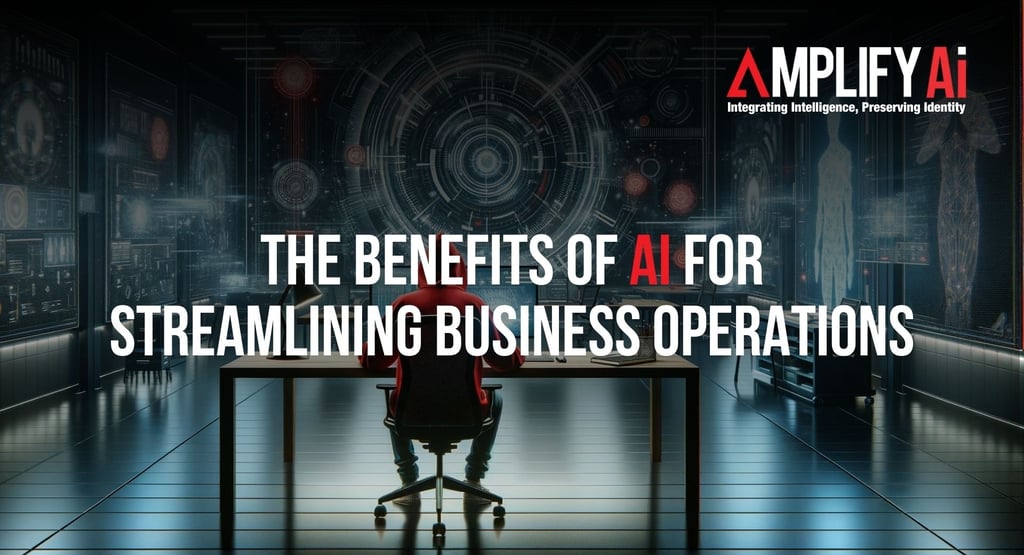The Benefits of AI for Streamlining Business Operations
Ronsley Vaz
4 min read


As we move into an increasingly data-driven world, artificial intelligence (AI) plays an increasingly important role in helping businesses streamline operations, reduce costs, and make better decisions. For example, AI is used in healthcare to analyse patient data and identify potential health risks before they become a problem. In finance, AI analyses large volumes of financial data and identifies trends and patterns that would be impossible for humans to identify. In retail, AI improves the shopping experience by providing personalised recommendations and streamlining the checkout process. AI is having a major impact on the world and is likely to continue to do so in the years to come. As businesses and organisations look for ways to stay ahead of the competition and achieve greater success, AI will play a key role in helping them achieve their goals.
What are the benefits of using Artificial Intelligence in your business? Because every entrepreneur needs something to rely on. And this is the solution.
Automation of Repetitive Tasks
One of the key benefits of using AI in business operations is the ability to automate repetitive tasks. Imagine a scenario where a customer service representative spends hours each day responding to the same inquiries repeatedly. With AI-powered chatbots, these inquiries can be handled quickly and efficiently, freeing up the representative's time to focus on more complex tasks.
Another example of AI automation is data entry. Many businesses still need to rely on manual data entry, which can be time-consuming and prone to errors. With AI, data can be extracted and entered automatically, reducing the risk of errors and freeing up employees to focus on more critical tasks.
Improved Decision-Making
Another benefit of using AI in business operations is the ability to analyse large amounts of data quickly and accurately. This can provide businesses with insights that can inform better decision-making. For example, a retail business may use AI to analyse sales data and identify trends that inform inventory management decisions. With access to this data in real-time, businesses can stay ahead of the competition and make strategic decisions that lead to growth and success.
The financial industry is another type of business that can benefit from improved decision-making after applying AI. AI-powered algorithms can analyse large amounts of financial data and provide insights to inform investment decisions. This can help financial professionals make more informed decisions, reduce the risk of errors, and ultimately improve client returns. Additionally, AI can help financial institutions detect and prevent fraud by identifying patterns and anomalies in financial transactions. By leveraging the power of AI, financial businesses can stay ahead of the competition and provide better services to their clients.
Enhanced Customer Experience
AI-powered chatbots and virtual assistants can also provide customers quick and helpful responses to their inquiries. This improves the customer experience and can lead to increased loyalty and retention. For example, imagine a customer trying to track a package and has a question about the delivery date. With an AI-powered chatbot, the customer can quickly get the information they need without waiting on hold or navigating a complex phone tree.
Predictive Maintenance
AI can also monitor equipment and machinery to detect potential issues before they become significant problems. This can reduce downtime and maintenance costs, increasing efficiency and productivity. For example, a manufacturing plant may use AI to monitor equipment and detect changes in performance that could indicate a potential issue. By catching these issues early, the plant can schedule maintenance before the equipment fails, reducing downtime and saving money.
The airline industry is another type of business that can benefit from predictive maintenance with AI. By monitoring aircraft components and engines in real time, AI can detect potential issues before they become significant problems. This can help airlines schedule maintenance more efficiently, reduce downtime, and improve safety for passengers. With the sheer number of flights and aircraft components involved, AI is essential for airlines to maintain their fleets and ensure reliable operation.
Personalised Marketing
Finally, AI can be used to analyse customer data to provide personalised marketing experiences that are tailored to individual preferences and behaviours. This can lead to increased engagement and conversions. For example, imagine a scenario where a customer is browsing an online store and sees a product they like. With AI-powered personalised marketing, the customer may receive a follow-up email or ad highlighting similar products or offering a discount on the item they are interested in.
Businesses in the fashion, beauty, and retail industries can use personalised marketing with AI to improve the customer experience and increase sales and revenue. However, it's important to balance the benefits of personalised marketing with ethical concerns such as data privacy and transparency.
We will likely see more ways for businesses to leverage it in personalised marketing. From chatbots to recommendation engines, AI has the potential to revolutionise the way companies engage with their customers and drive growth and success.
Incorporating AI into business operations has many benefits, including automation of repetitive tasks, improved decision-making, enhanced customer experience, predictive maintenance, and personalised marketing. By utilising AI, businesses can streamline operations and stay ahead of the competition in an increasingly digital world. As AI technology continues to evolve, we will likely see even more ways businesses can leverage it to achieve tremendous success.

Subscribe to the podcast
Subscribe now to "Amplify Ai" and let's set sail together on this exciting voyage towards business growth and success.



